By Bennet Harvey
While all industries are important to Citizen lives, the one most directly impacting the equitable function of democracy is News Media. This industry emerged in the 15th century as newsletters and town criers paid for the news product, which has always been bundled with advertisements.
European countries developed the concept of the Fourth Estate referring to the press as a fourth power balancing nobility, clergy, and commoners. The term Fourth Estate evolved in the US to be interpreted as a balance to the three branches of government in the American republic: Legislative, Executive and Judicial. Not a fourth branch of government, because that would violate the independence of the press.
Until very recently, ad and subscription revenue streams have defined the news media as an industry. And it was a very profitable one for the great news barons of the last coupe of centuries. Family names like Hearst, McCormick, Sulzberger, McClatchey, Chandler, Knight, Ridder built great wealth in the news, newsprint, and transportation industries delivering trees to driveways.
In hindsight, we have learned that news is not the most effective means of delivering ads to Citizens. Search engines and social media took that title shortly after the turn of the century. We also know that fewer citizens are buying newspapers, now that the quality of the product and budgets, journalists and content have been cut by more than half due to the lost ad revenue. This, in turn has continued to increase the subscription cost of news media to Citizens, and so fewer low-income Citizens get quality news.
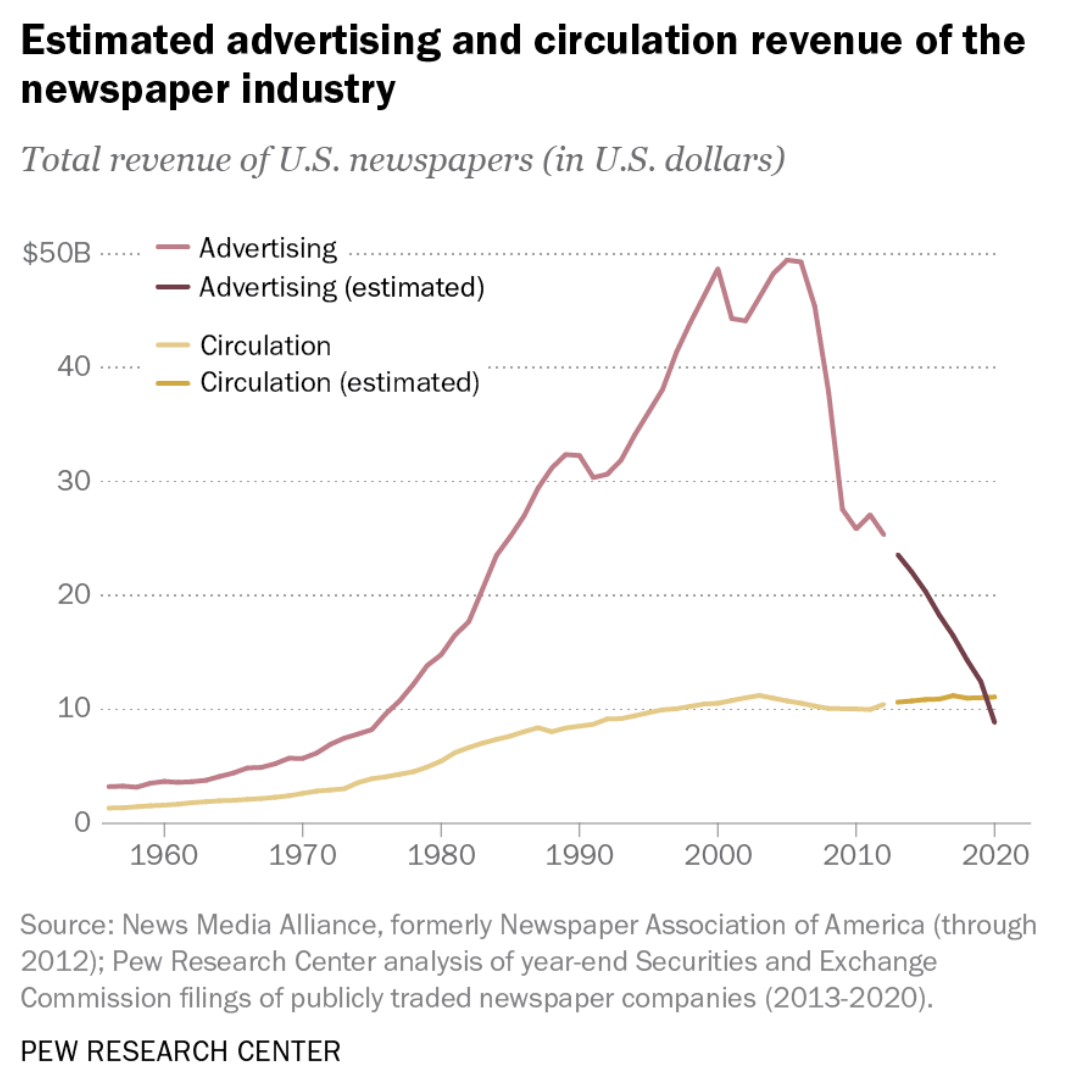
News Media’s critical role in the function of an equitable democracy was best described by Thomas Jefferson around the time of the drafting of the U.S. Constitution and Bill of Rights. Jefferson said:
“The people are the only censors of their governors: and even their errors will tend to keep these to the true principles of their institution. To punish these errors too severely would be to suppress the only safeguard of the public liberty. The way to prevent these irregular interpositions of the people is to give them full information of their affairs thro’ the channel of the public papers, & to contrive that those papers should penetrate the whole mass of the people. The basis of our governments being the opinion of the people, the very first object should be to keep that right; and were it left to me to decide whether we should have a government without newspapers or newspapers without a government, I should not hesitate a moment to prefer the latter. But I should mean that every man should receive those papers & be capable of reading them.”
– Thomas Jefferson, 1787
News Media has never met Jefferson’s ideals, in part because quality news has never been available to all members of our society. This has been due both to education and economic access. Low income Citizens can’t afford to pay for news, and low education and non-English speaking Citizens aren’t able to use the news to effectively participate in the democratic process.
Some would argue the news also has not meet Jefferson’s ideals because its coverage sometimes appears to be biased by factors outside the control of its Citizen-readers. These have included suspected motivations to:
- make the product exciting, in order to induce single copy sales.
- appeal to and not upset business advertisers, with their influence being in direct proportion to their size.
- maintain good relations with government agencies, police, fire departments in order to retain access
- spin the news toward their vested interests by publishers, editors, and journalists and advertisers.
Is This How It Must Be?
Imagining something different is always difficult for anyone inside a long-standing system. As consumers of news, it’s hard to imagine any other way journalism could be delivered to us. That is, without the risk of it being under the control of government or some other nefarious entity.
In 2022 a Wilmington, DE civic organization asked Citizens what they wish news media would do if it could be redesigned from scratch. One respondent cut to the heart of news media’s role in democracy.
“I think [news] could do a better job explaining what major bills will do and the impact it’ll have. Take away the Democrat-Republican stuff, take away the spending aspect, but just getting to the root of bills and explaining it on a basic level to people of what a certain bill will do.”
— Wilmington, DE Citizen
Delaware’s Local News & Information Ecosystem Assessment Key Findings and Opportunities – June 7, 2022
When one thinks about “the spending aspect” as subscriptions and ads, this quote is a distillation of the essential function of news media’s role in democracy as envisioned by Thomas Jefferson.
This is because society considers news media to be an industry. Today our public policy places the same incentives on critical functions as it does on general commerce. This has led to today’s architecture of news media:
- Advertising, subscription prices,
- fragmented experience due to ads, and
- episodic news cycle designed to create inventory for ads.
Ultimately, this has led to commercial barons controlling our critical societal functions and manipulating the very process of legislation and regulation meant to hold them accountable.
And now, our treatment of the news media as an industry under full capitalist motivations, has led to the nearly complete destruction of news media’s ability to achieve either of Jefferson’s precepts for news media’s role in democracy.
Should Society Face the Same Fate as an Industry or Technology at the End of its Lifecycle?
There is a frightening parallel between the Newspaper industry and the CD-ROM medium of transmitting Music in terms of the fate of industries as they reach the end of their lifecycles.
Note the parallel path of revenues for news media and CDs, growing fast and then peaking as the similarly flawed alternative of streaming appeared.
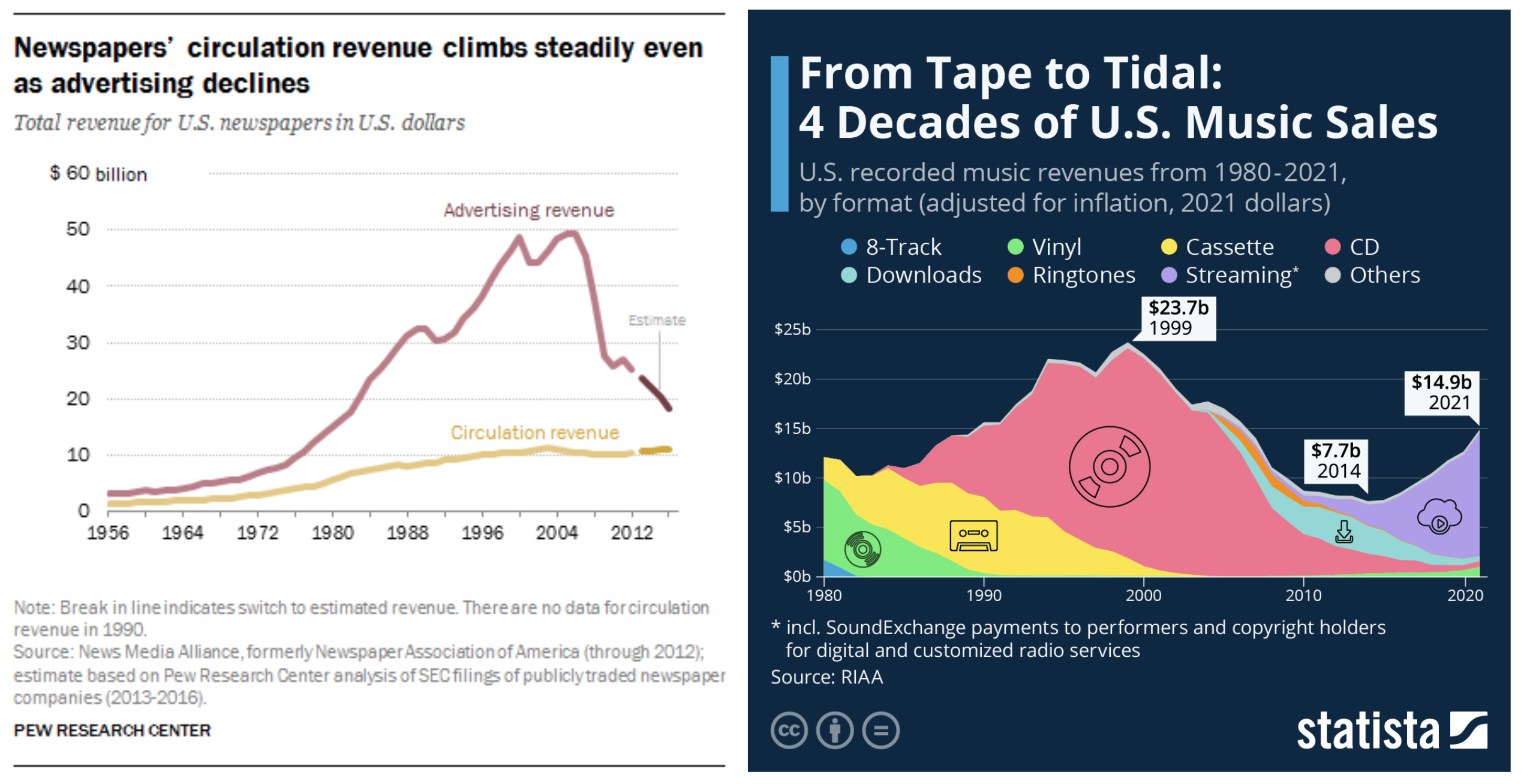
Was the ad / subscriptions commercial delivery system for news just a temporary medium like CD-ROM for music? If so, what followed for news appears to have been the broken medium of social media, much like streaming for music.
Is there a next alternative after streaming? Undoubtedly, as “progress” continues. Will it be another temporary flawed solution? Probably, unless we can consciously address unintended consequences before unleashing a new temprary solution on society which will devour huge amounts of societal energy, only to dissolve into another successor.
Or are we now prepared to take responsibility for outcomes and start planning beyond the end of our noses?
Failure to Innovate has Led to Consolidation of Control and Reduction of Access
The failure of the newspaper industry to innovate an economically competitive citizen experience and business model has contributed to the industry’s consolidation into the hands of an ever-smaller number of private equity investors and public companies.
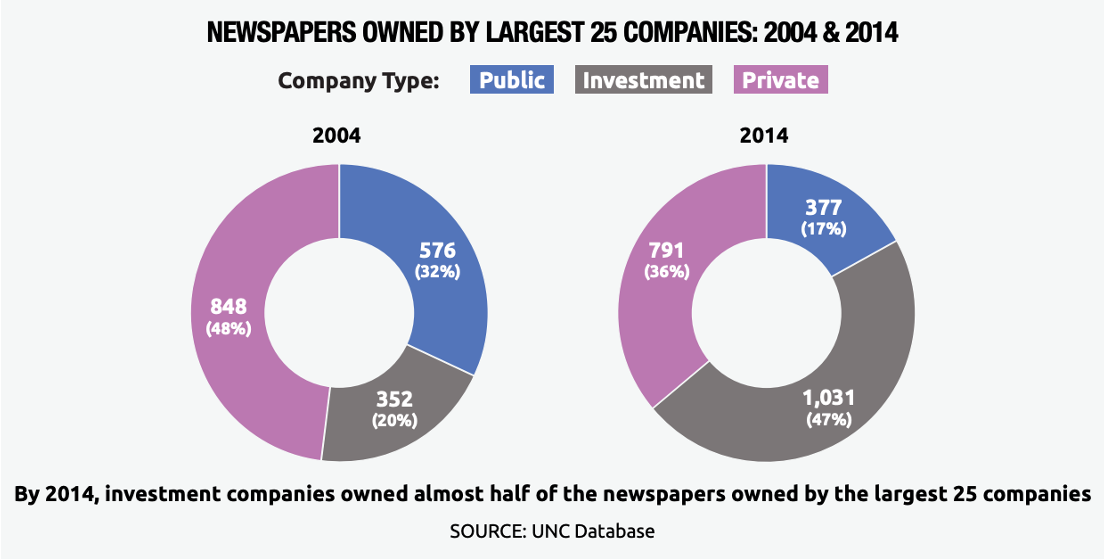
This, in turn has led to a dramatic collapse in the number of daily and weekly newspapers in the country, and the loss of half of our newspaper reporters.
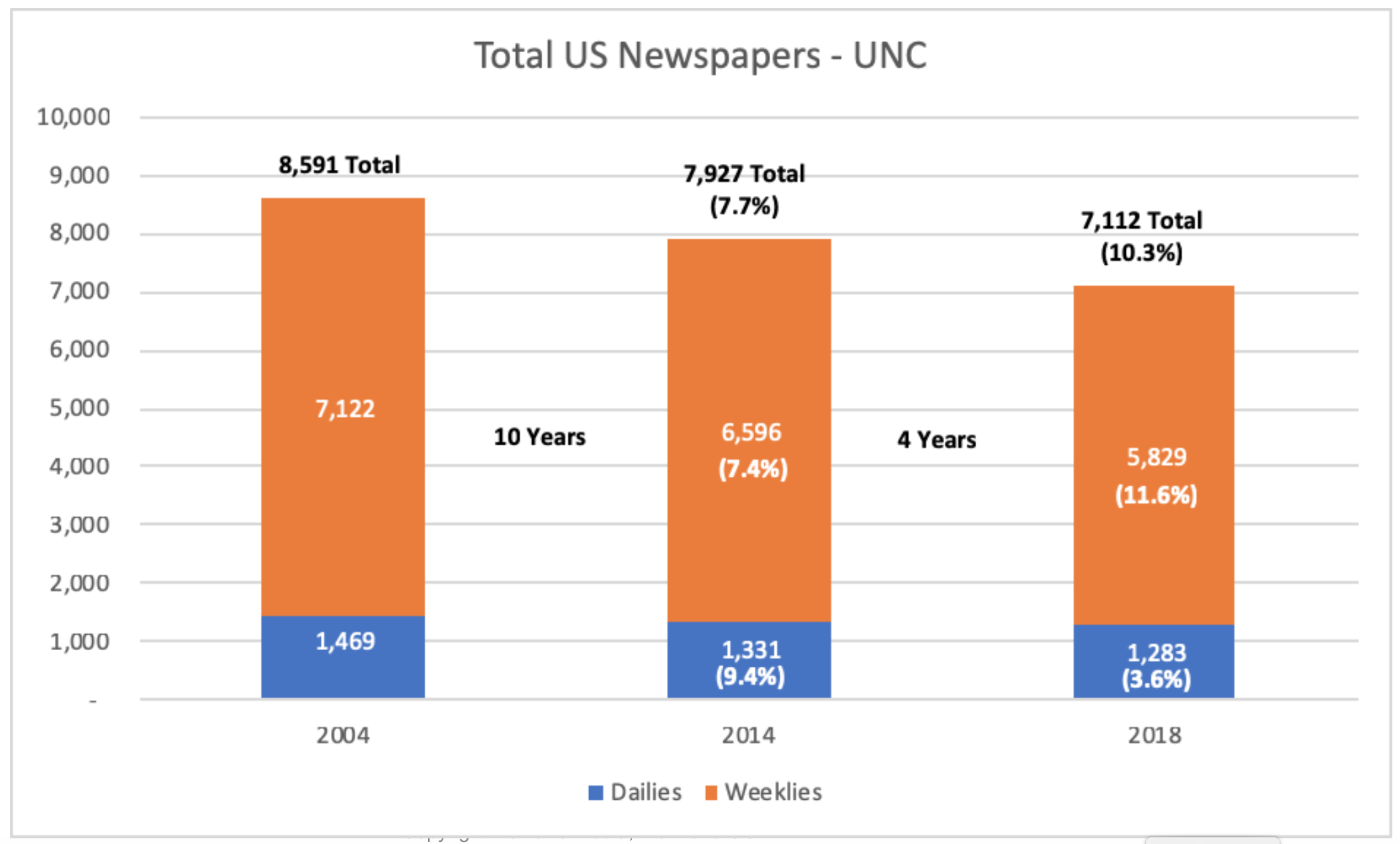
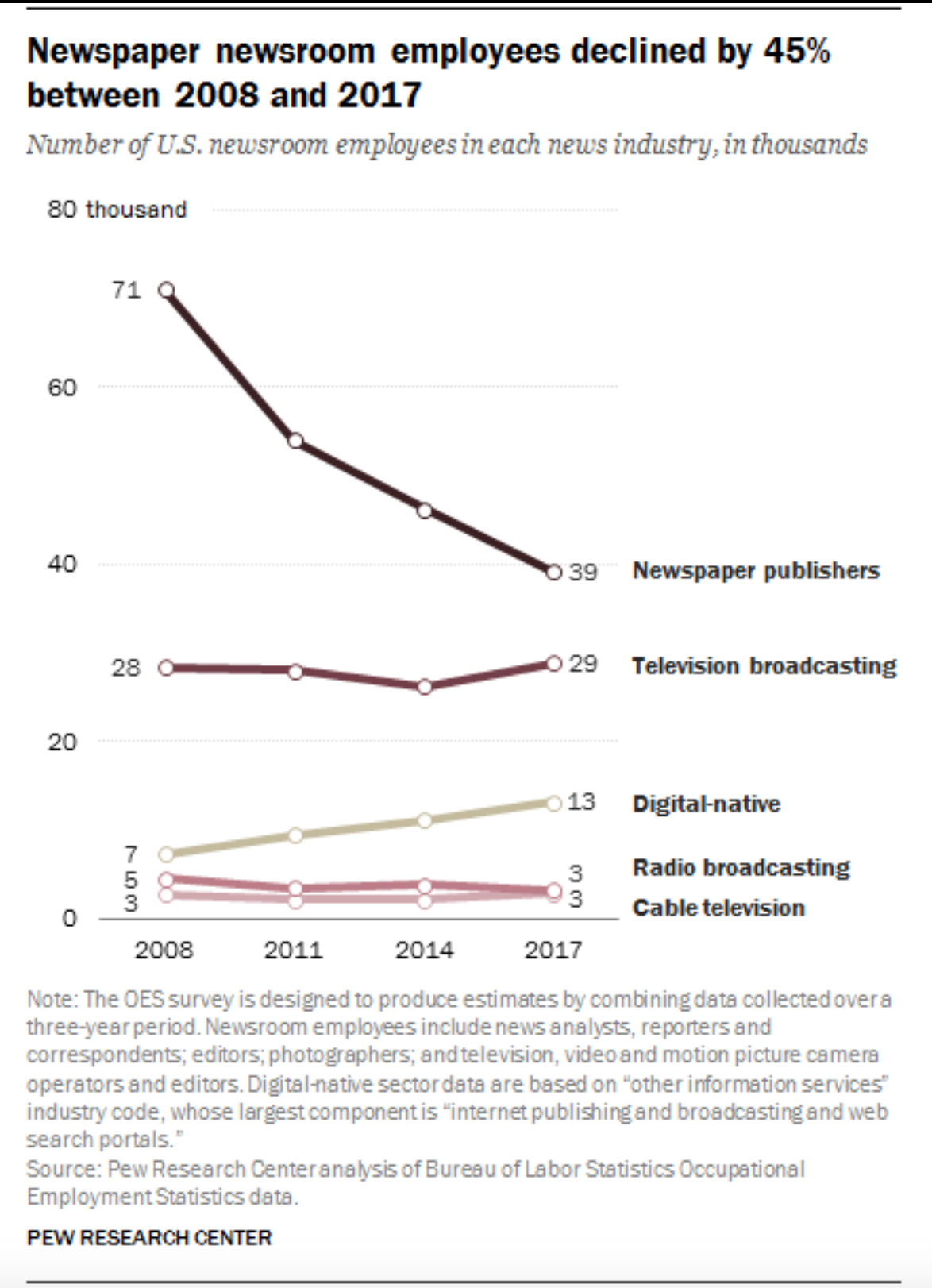
This report on the 2022 State of Local News from Penelope Muse Abernathy teacher at the Northwestern University Medill School of Journalism and former Knight Chair in Journalism and Digital Media Economics at the University of North Carolina reveals this trend is tightly linked to the emergence of ‘news deserts’, local markets across the US in which Citizens receive little or no local news coverage. Citizens in these communities must fulfill their local civic responsibilities supported only with regional news coverage from cities hundreds of miles away. With no coverage of local City Council, Panning Commission or School Board meetings, not to mention crime and community news, these Citizens must still vote and pay taxes.
The gist is that the state of news media has now reached a crisis point for American democracy.
Owners of the remaining newspaper chains fall into two camps:
- Investors and families with good societal intent who continue to invest in or at least maintain the integrity of their editorial product at some cost to their investment returns.
- Private equity firms who harvest the asset value of news businesses to provide dividends for their investors, ignoring societal consequences as erroneous considerations in pursuit of a single-minded goal to provide short term gains to their small pool of investors. Nearly every year another major US newspaper chain is absorbed by private equity buyers.
Note in the graph below, that Private Equity ownership of dailies among the top-25 companies increased from 22.5% of total in 2004 to 50.2% in 2014. The trend has only accelerated since 2014 according to details in Abernathy’s report. We believe there can only be a couple of rounds of additional news holding company consolidation before the ‘fire sales’ give way to industry insolvency.
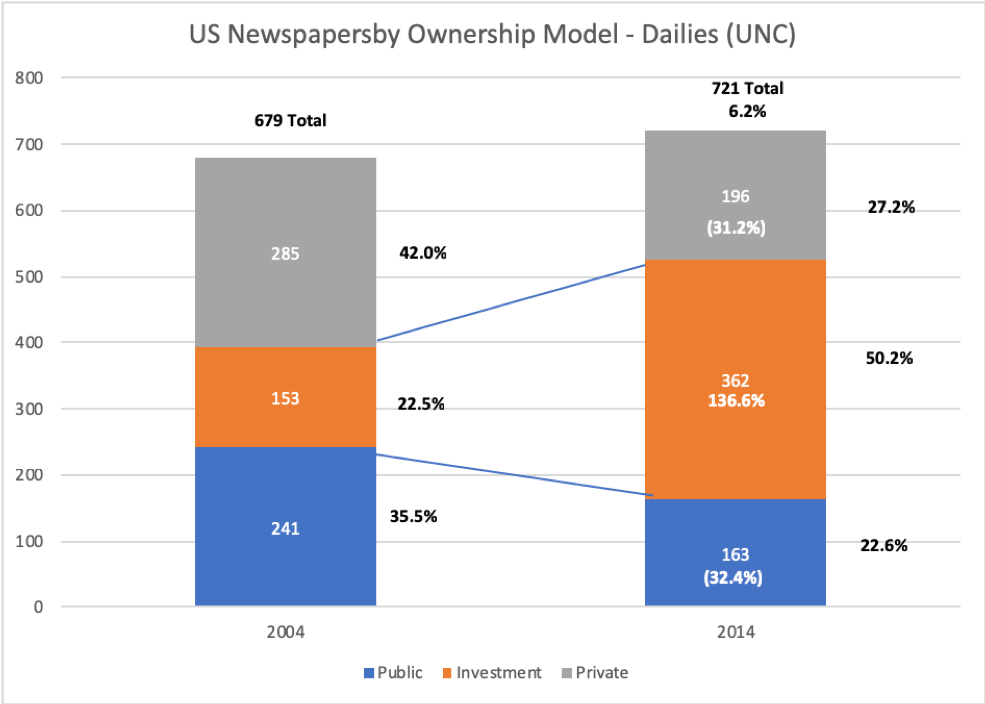
ReNews is designed to capitalize on this moment of crisis and opportunity by injecting a new option – real change. Change is most possible when the entrenched status quo fails.
The cruel details of this consolidation of news providers are visible in the decline of the Denver Post at the hands of Alden Global Capital. This private equity firm, operating as Digital First Media, is one of a handful of investment companies that have emerged to control the majority of daily papers owned by the top-25 companies.

Furthermore, while the number of dailies owned by the top-25 companies increased 6.2% in the 10 years from 2004-2014, the total number of dailies in the U.S. dropped by 7.7% in the same period. The total number of papers dropped still more steeply by another 10.3% in the four years from 2014-2018, largely due to closing of papers by the private equity firms.

The focus of Abernathy’s concern are the expanding news deserts across America. The interactive graphic below shows the current status of local news availability by county across the US.
Among the implications of these disturbing trends covered in the 2022 State of Local News Report are:
- further consolidation of newspaper ownership in the hands of a small number of holding companies,
- continued shuttering of papers across America (news deserts), and
- deep cuts in newsroom reporters and editors at the papers that remain (news drought).
ReNews’ Role in Renewal
At ReNews we believe that the ‘buy and harvest’ strategy conducted by Alden and other private equity firms is exploiting the inability of the newspaper industry to find a new and viable economic model. If news outlets existed in a separate and defensible economic model from social media and search, they would be in a better position to restore their function in our democracy.
ReNews proposes to help privately and publicly-held publishers avoid this fate by offering our portfolio of news ecosystem innovations, as well as consulting services to help publishers with decimated staffs to adopt this sustainable Citizen experience and economic model for news.Graham,
